International Business Report: Letter of Credit and Dispute Resolution
VerifiedAdded on 2020/12/09
|11
|2700
|369
Report
AI Summary
This report provides a comprehensive analysis of international business practices, focusing on the crucial roles of letters of credit and dispute resolution mechanisms. It begins by defining international business and its scope, then delves into the structure and importance of letters of credit, explaining their function in securing payments and facilitating trade, particularly within the retail industry. The report further explores the current structure and significance of dispute resolution in international business, covering methods like litigation, arbitration, and negotiation. It highlights the impact of these financial tools on a business's financial viability and risk management, emphasizing how strategic choices can influence outcomes. The report concludes by summarizing the key findings and reinforcing the critical importance of these elements for successful international trade and business operations within the retail sector.
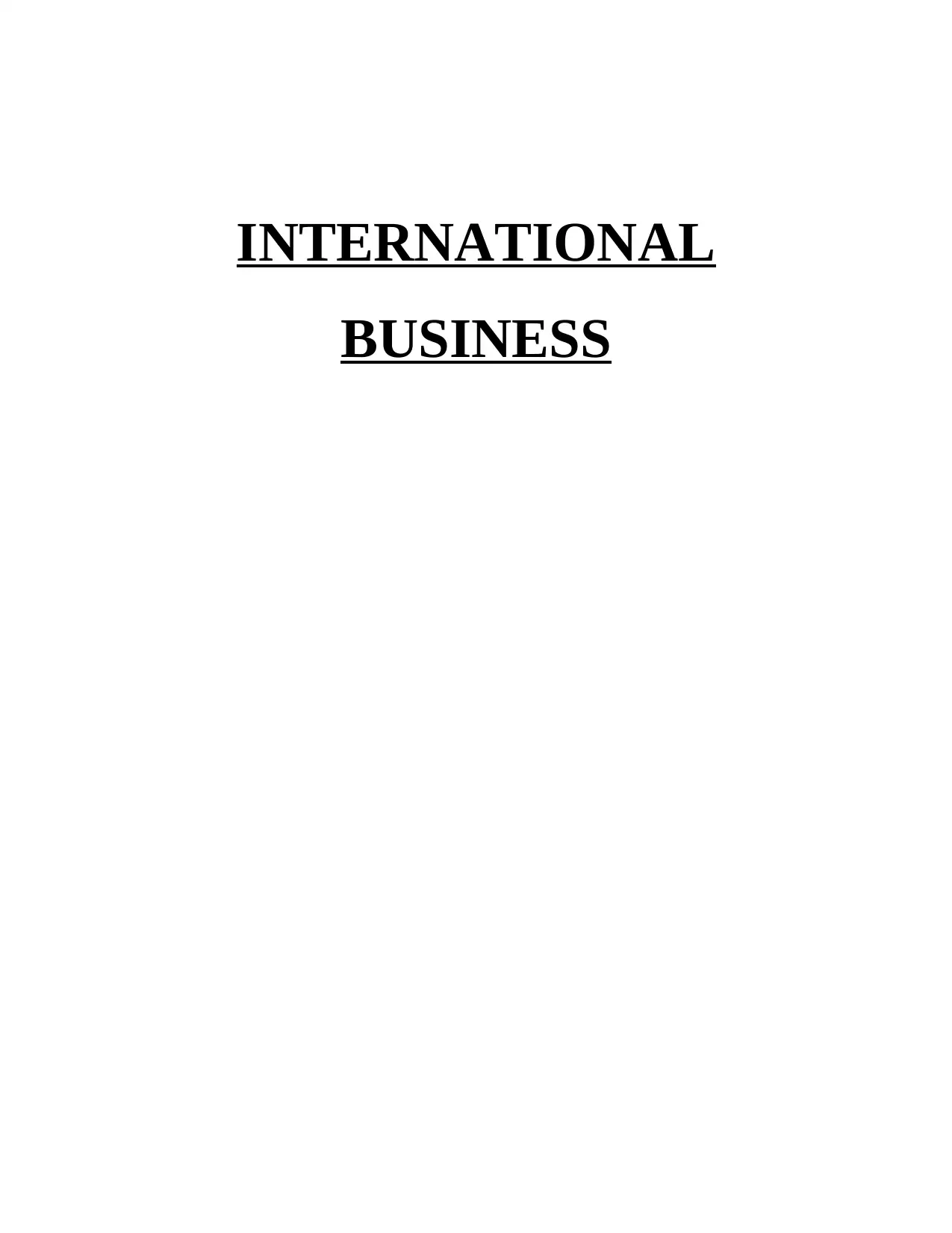
INTERNATIONAL
BUSINESS
BUSINESS
Paraphrase This Document
Need a fresh take? Get an instant paraphrase of this document with our AI Paraphraser
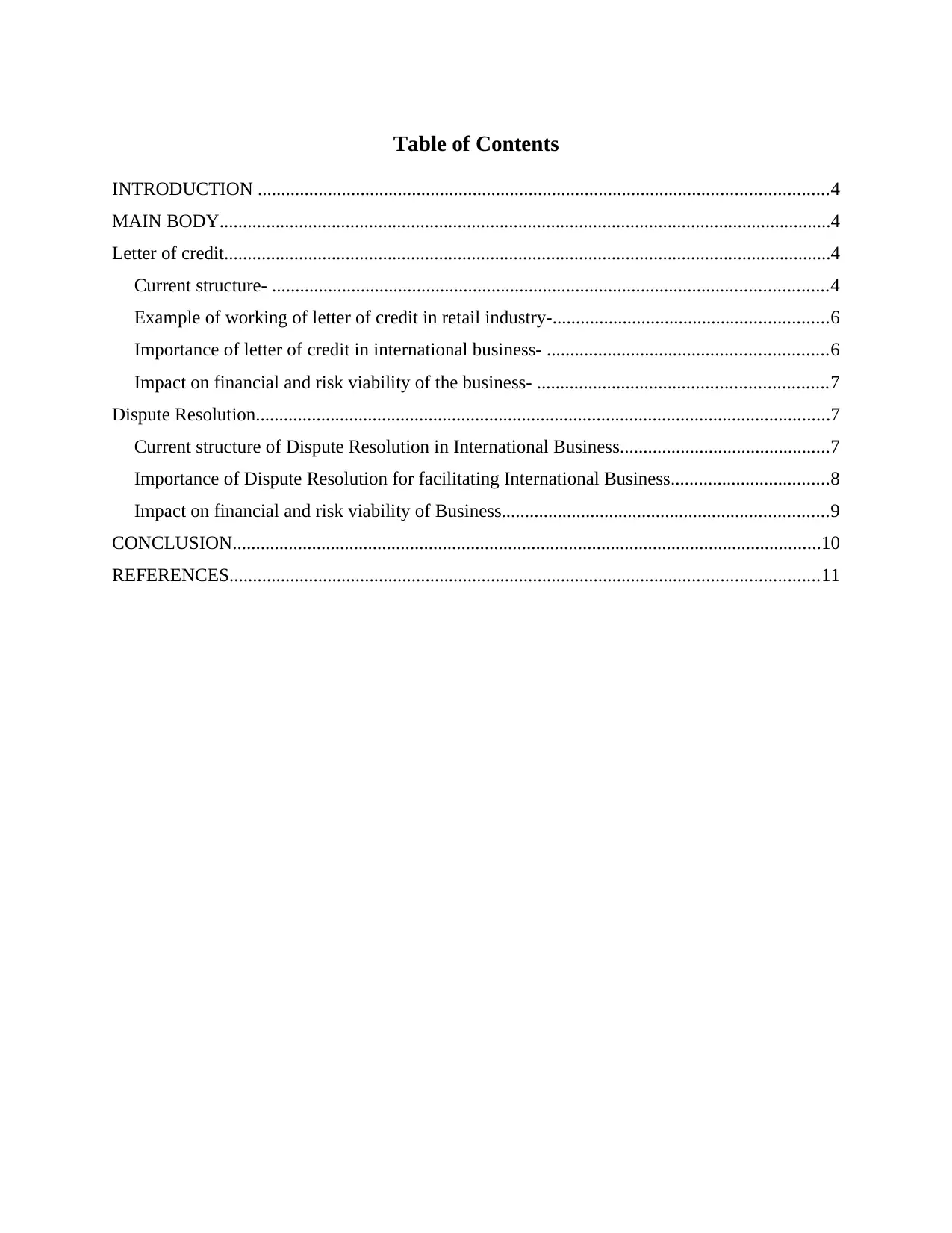
Table of Contents
INTRODUCTION ..........................................................................................................................4
MAIN BODY...................................................................................................................................4
Letter of credit..................................................................................................................................4
Current structure- .......................................................................................................................4
Example of working of letter of credit in retail industry-...........................................................6
Importance of letter of credit in international business- ............................................................6
Impact on financial and risk viability of the business- ..............................................................7
Dispute Resolution...........................................................................................................................7
Current structure of Dispute Resolution in International Business.............................................7
Importance of Dispute Resolution for facilitating International Business..................................8
Impact on financial and risk viability of Business......................................................................9
CONCLUSION..............................................................................................................................10
REFERENCES..............................................................................................................................11
INTRODUCTION ..........................................................................................................................4
MAIN BODY...................................................................................................................................4
Letter of credit..................................................................................................................................4
Current structure- .......................................................................................................................4
Example of working of letter of credit in retail industry-...........................................................6
Importance of letter of credit in international business- ............................................................6
Impact on financial and risk viability of the business- ..............................................................7
Dispute Resolution...........................................................................................................................7
Current structure of Dispute Resolution in International Business.............................................7
Importance of Dispute Resolution for facilitating International Business..................................8
Impact on financial and risk viability of Business......................................................................9
CONCLUSION..............................................................................................................................10
REFERENCES..............................................................................................................................11

⊘ This is a preview!⊘
Do you want full access?
Subscribe today to unlock all pages.

Trusted by 1+ million students worldwide
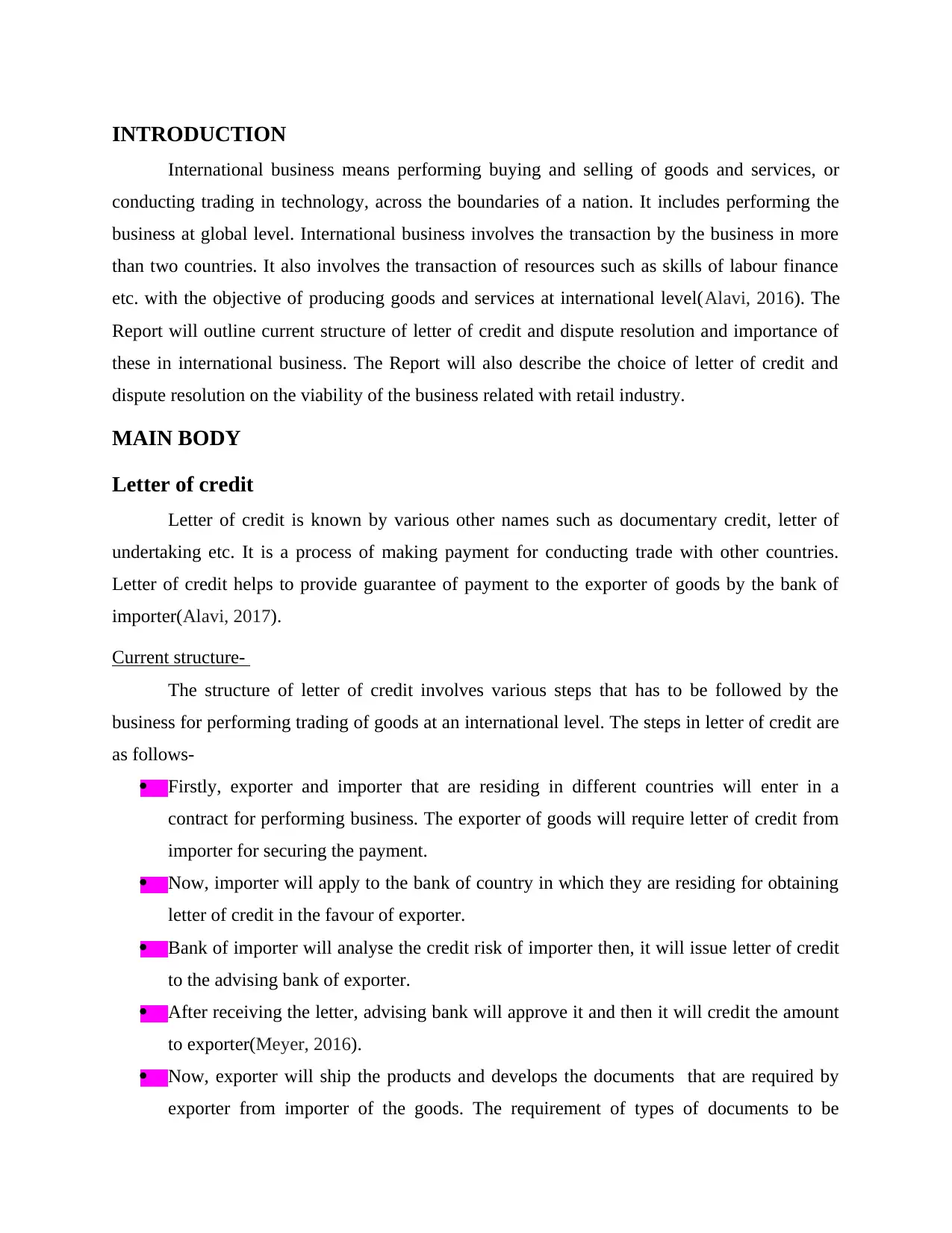
INTRODUCTION
International business means performing buying and selling of goods and services, or
conducting trading in technology, across the boundaries of a nation. It includes performing the
business at global level. International business involves the transaction by the business in more
than two countries. It also involves the transaction of resources such as skills of labour finance
etc. with the objective of producing goods and services at international level(Alavi, 2016). The
Report will outline current structure of letter of credit and dispute resolution and importance of
these in international business. The Report will also describe the choice of letter of credit and
dispute resolution on the viability of the business related with retail industry.
MAIN BODY
Letter of credit
Letter of credit is known by various other names such as documentary credit, letter of
undertaking etc. It is a process of making payment for conducting trade with other countries.
Letter of credit helps to provide guarantee of payment to the exporter of goods by the bank of
importer(Alavi, 2017).
Current structure-
The structure of letter of credit involves various steps that has to be followed by the
business for performing trading of goods at an international level. The steps in letter of credit are
as follows-
Firstly, exporter and importer that are residing in different countries will enter in a
contract for performing business. The exporter of goods will require letter of credit from
importer for securing the payment.
Now, importer will apply to the bank of country in which they are residing for obtaining
letter of credit in the favour of exporter.
Bank of importer will analyse the credit risk of importer then, it will issue letter of credit
to the advising bank of exporter.
After receiving the letter, advising bank will approve it and then it will credit the amount
to exporter(Meyer, 2016).
Now, exporter will ship the products and develops the documents that are required by
exporter from importer of the goods. The requirement of types of documents to be
International business means performing buying and selling of goods and services, or
conducting trading in technology, across the boundaries of a nation. It includes performing the
business at global level. International business involves the transaction by the business in more
than two countries. It also involves the transaction of resources such as skills of labour finance
etc. with the objective of producing goods and services at international level(Alavi, 2016). The
Report will outline current structure of letter of credit and dispute resolution and importance of
these in international business. The Report will also describe the choice of letter of credit and
dispute resolution on the viability of the business related with retail industry.
MAIN BODY
Letter of credit
Letter of credit is known by various other names such as documentary credit, letter of
undertaking etc. It is a process of making payment for conducting trade with other countries.
Letter of credit helps to provide guarantee of payment to the exporter of goods by the bank of
importer(Alavi, 2017).
Current structure-
The structure of letter of credit involves various steps that has to be followed by the
business for performing trading of goods at an international level. The steps in letter of credit are
as follows-
Firstly, exporter and importer that are residing in different countries will enter in a
contract for performing business. The exporter of goods will require letter of credit from
importer for securing the payment.
Now, importer will apply to the bank of country in which they are residing for obtaining
letter of credit in the favour of exporter.
Bank of importer will analyse the credit risk of importer then, it will issue letter of credit
to the advising bank of exporter.
After receiving the letter, advising bank will approve it and then it will credit the amount
to exporter(Meyer, 2016).
Now, exporter will ship the products and develops the documents that are required by
exporter from importer of the goods. The requirement of types of documents to be
Paraphrase This Document
Need a fresh take? Get an instant paraphrase of this document with our AI Paraphraser
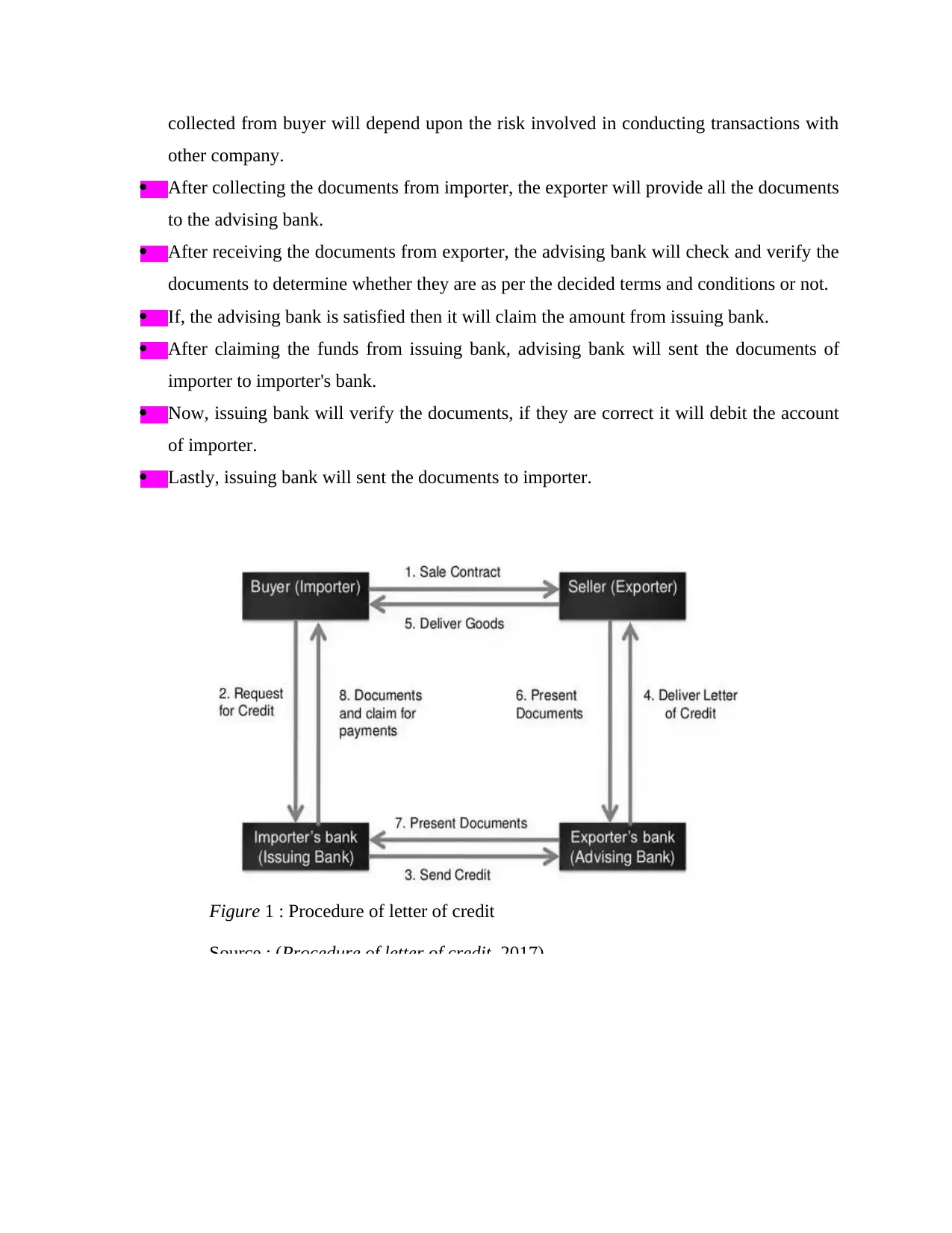
collected from buyer will depend upon the risk involved in conducting transactions with
other company.
After collecting the documents from importer, the exporter will provide all the documents
to the advising bank.
After receiving the documents from exporter, the advising bank will check and verify the
documents to determine whether they are as per the decided terms and conditions or not.
If, the advising bank is satisfied then it will claim the amount from issuing bank.
After claiming the funds from issuing bank, advising bank will sent the documents of
importer to importer's bank.
Now, issuing bank will verify the documents, if they are correct it will debit the account
of importer.
Lastly, issuing bank will sent the documents to importer.
Figure 1 : Procedure of letter of credit
Source : (Procedure of letter of credit, 2017)
other company.
After collecting the documents from importer, the exporter will provide all the documents
to the advising bank.
After receiving the documents from exporter, the advising bank will check and verify the
documents to determine whether they are as per the decided terms and conditions or not.
If, the advising bank is satisfied then it will claim the amount from issuing bank.
After claiming the funds from issuing bank, advising bank will sent the documents of
importer to importer's bank.
Now, issuing bank will verify the documents, if they are correct it will debit the account
of importer.
Lastly, issuing bank will sent the documents to importer.
Figure 1 : Procedure of letter of credit
Source : (Procedure of letter of credit, 2017)
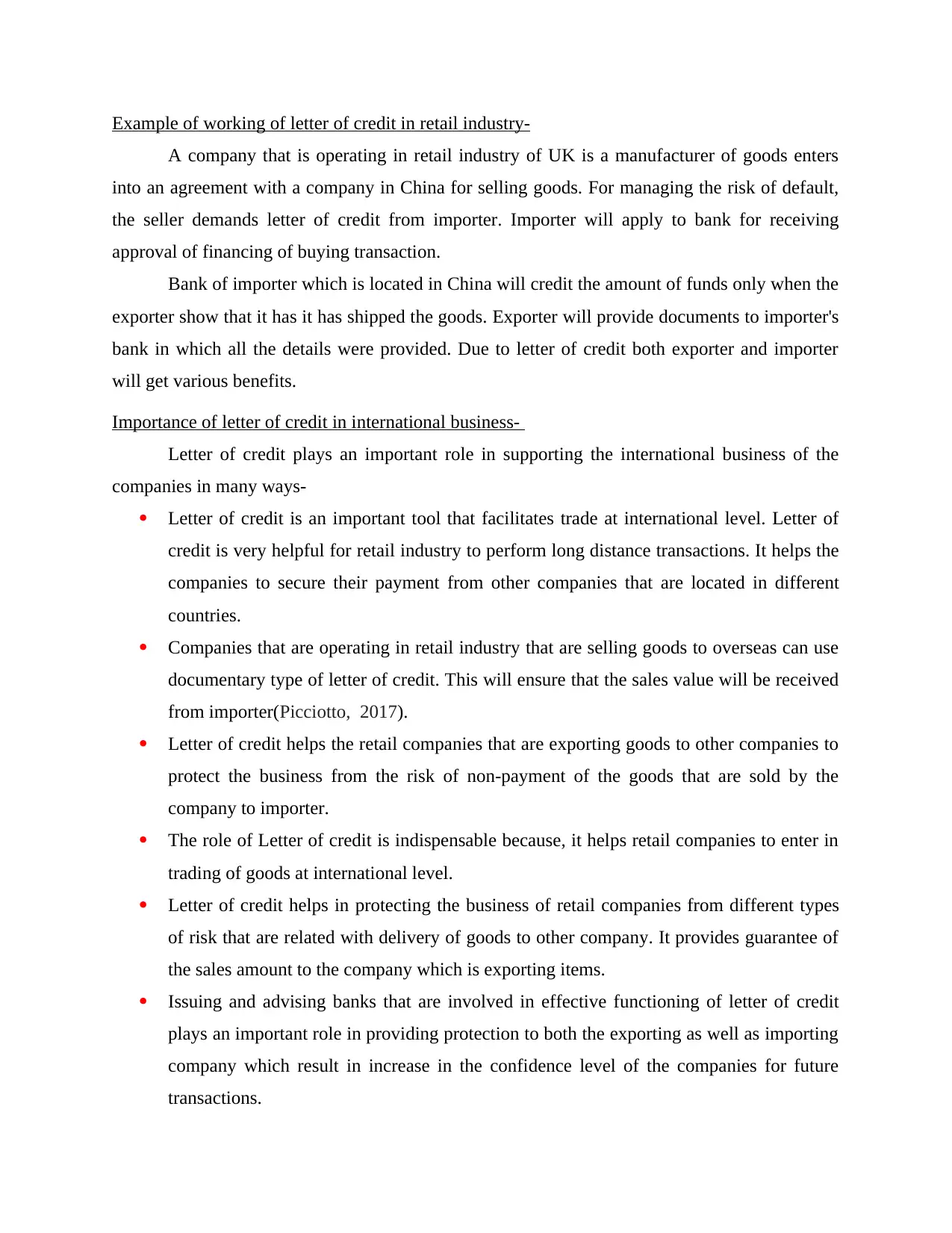
Example of working of letter of credit in retail industry-
A company that is operating in retail industry of UK is a manufacturer of goods enters
into an agreement with a company in China for selling goods. For managing the risk of default,
the seller demands letter of credit from importer. Importer will apply to bank for receiving
approval of financing of buying transaction.
Bank of importer which is located in China will credit the amount of funds only when the
exporter show that it has it has shipped the goods. Exporter will provide documents to importer's
bank in which all the details were provided. Due to letter of credit both exporter and importer
will get various benefits.
Importance of letter of credit in international business-
Letter of credit plays an important role in supporting the international business of the
companies in many ways-
Letter of credit is an important tool that facilitates trade at international level. Letter of
credit is very helpful for retail industry to perform long distance transactions. It helps the
companies to secure their payment from other companies that are located in different
countries.
Companies that are operating in retail industry that are selling goods to overseas can use
documentary type of letter of credit. This will ensure that the sales value will be received
from importer(Picciotto, 2017).
Letter of credit helps the retail companies that are exporting goods to other companies to
protect the business from the risk of non-payment of the goods that are sold by the
company to importer.
The role of Letter of credit is indispensable because, it helps retail companies to enter in
trading of goods at international level.
Letter of credit helps in protecting the business of retail companies from different types
of risk that are related with delivery of goods to other company. It provides guarantee of
the sales amount to the company which is exporting items.
Issuing and advising banks that are involved in effective functioning of letter of credit
plays an important role in providing protection to both the exporting as well as importing
company which result in increase in the confidence level of the companies for future
transactions.
A company that is operating in retail industry of UK is a manufacturer of goods enters
into an agreement with a company in China for selling goods. For managing the risk of default,
the seller demands letter of credit from importer. Importer will apply to bank for receiving
approval of financing of buying transaction.
Bank of importer which is located in China will credit the amount of funds only when the
exporter show that it has it has shipped the goods. Exporter will provide documents to importer's
bank in which all the details were provided. Due to letter of credit both exporter and importer
will get various benefits.
Importance of letter of credit in international business-
Letter of credit plays an important role in supporting the international business of the
companies in many ways-
Letter of credit is an important tool that facilitates trade at international level. Letter of
credit is very helpful for retail industry to perform long distance transactions. It helps the
companies to secure their payment from other companies that are located in different
countries.
Companies that are operating in retail industry that are selling goods to overseas can use
documentary type of letter of credit. This will ensure that the sales value will be received
from importer(Picciotto, 2017).
Letter of credit helps the retail companies that are exporting goods to other companies to
protect the business from the risk of non-payment of the goods that are sold by the
company to importer.
The role of Letter of credit is indispensable because, it helps retail companies to enter in
trading of goods at international level.
Letter of credit helps in protecting the business of retail companies from different types
of risk that are related with delivery of goods to other company. It provides guarantee of
the sales amount to the company which is exporting items.
Issuing and advising banks that are involved in effective functioning of letter of credit
plays an important role in providing protection to both the exporting as well as importing
company which result in increase in the confidence level of the companies for future
transactions.
⊘ This is a preview!⊘
Do you want full access?
Subscribe today to unlock all pages.

Trusted by 1+ million students worldwide

Impact on financial and risk viability of the business-
The choice of various types of letter of credit can impact the financial viability of retail
companies in different ways. Letter of credit can also affect the business of companies that are
involved in international trade through various types of risks.
Letter of credit provides security of the payment for the goods delivered by the company
to importer((Alavi, 2016)). It helps in improving the financial viability of exporter through
increase in the ability of exporter to generate revenue from sales by securing the payment from
importer. The business of exporter as well as importer both can be affected by the risk that are
involved in letter of credit. The business of exporter can be negatively affected by fraud risk
involved in letter of credit. The business of importer can be affected by non delivery of items by
the exporter, goods received with poor quality and risk of exchange rate etc.
Dispute Resolution
Retail industry provides wide range of products and services to customers. The industry
operates its business activities through retail stores, internet retailing, convenience store,
speciality store and many more. The scope of retail industry is wide up-to global and
international markets as it is matured and also highly competitive (Sourgens, Duggal and Laird,
2018). The increasing strength in the online shopping also provides development of retail
industries in the international markets. But, industry can also face many disputes due to wide
range of activities, operations and people involved in it. Every business organisation may face
issue of disputes between different employees or different levels of management. Therefore,
industry focuses on implementing dispute resolution techniques and principles. Dispute
resolution is the process through which disputes between different parties can be resolved. Thus,
in business practices, dispute resolution effectively seeks for achieving fairness for all the
participants, and it may often moderated by the third party. There are different methods for
resolving the disputes which includes arbitration, mediation and collaborative law.
Current structure of Dispute Resolution in International Business
Businesses involved in the international business disputes focuses on reaching an
agreement through the dispute resolution process. Retail businesses focuses on resolution of
disputes happening between the different nations and parties in the context of international
business. Different countries have different legal procedures that provides primary means for the
The choice of various types of letter of credit can impact the financial viability of retail
companies in different ways. Letter of credit can also affect the business of companies that are
involved in international trade through various types of risks.
Letter of credit provides security of the payment for the goods delivered by the company
to importer((Alavi, 2016)). It helps in improving the financial viability of exporter through
increase in the ability of exporter to generate revenue from sales by securing the payment from
importer. The business of exporter as well as importer both can be affected by the risk that are
involved in letter of credit. The business of exporter can be negatively affected by fraud risk
involved in letter of credit. The business of importer can be affected by non delivery of items by
the exporter, goods received with poor quality and risk of exchange rate etc.
Dispute Resolution
Retail industry provides wide range of products and services to customers. The industry
operates its business activities through retail stores, internet retailing, convenience store,
speciality store and many more. The scope of retail industry is wide up-to global and
international markets as it is matured and also highly competitive (Sourgens, Duggal and Laird,
2018). The increasing strength in the online shopping also provides development of retail
industries in the international markets. But, industry can also face many disputes due to wide
range of activities, operations and people involved in it. Every business organisation may face
issue of disputes between different employees or different levels of management. Therefore,
industry focuses on implementing dispute resolution techniques and principles. Dispute
resolution is the process through which disputes between different parties can be resolved. Thus,
in business practices, dispute resolution effectively seeks for achieving fairness for all the
participants, and it may often moderated by the third party. There are different methods for
resolving the disputes which includes arbitration, mediation and collaborative law.
Current structure of Dispute Resolution in International Business
Businesses involved in the international business disputes focuses on reaching an
agreement through the dispute resolution process. Retail businesses focuses on resolution of
disputes happening between the different nations and parties in the context of international
business. Different countries have different legal procedures that provides primary means for the
Paraphrase This Document
Need a fresh take? Get an instant paraphrase of this document with our AI Paraphraser
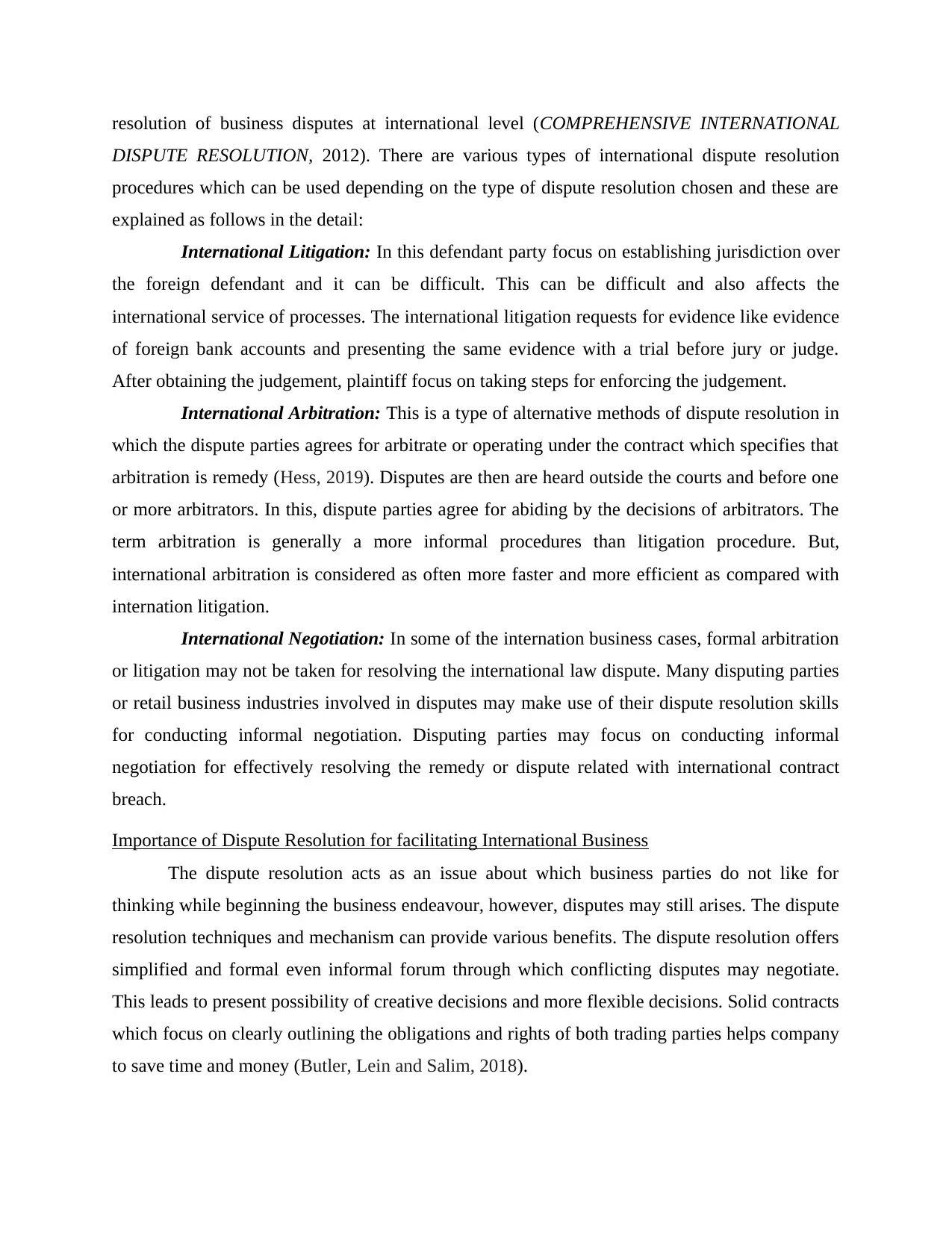
resolution of business disputes at international level (COMPREHENSIVE INTERNATIONAL
DISPUTE RESOLUTION, 2012). There are various types of international dispute resolution
procedures which can be used depending on the type of dispute resolution chosen and these are
explained as follows in the detail:
International Litigation: In this defendant party focus on establishing jurisdiction over
the foreign defendant and it can be difficult. This can be difficult and also affects the
international service of processes. The international litigation requests for evidence like evidence
of foreign bank accounts and presenting the same evidence with a trial before jury or judge.
After obtaining the judgement, plaintiff focus on taking steps for enforcing the judgement.
International Arbitration: This is a type of alternative methods of dispute resolution in
which the dispute parties agrees for arbitrate or operating under the contract which specifies that
arbitration is remedy (Hess, 2019). Disputes are then are heard outside the courts and before one
or more arbitrators. In this, dispute parties agree for abiding by the decisions of arbitrators. The
term arbitration is generally a more informal procedures than litigation procedure. But,
international arbitration is considered as often more faster and more efficient as compared with
internation litigation.
International Negotiation: In some of the internation business cases, formal arbitration
or litigation may not be taken for resolving the international law dispute. Many disputing parties
or retail business industries involved in disputes may make use of their dispute resolution skills
for conducting informal negotiation. Disputing parties may focus on conducting informal
negotiation for effectively resolving the remedy or dispute related with international contract
breach.
Importance of Dispute Resolution for facilitating International Business
The dispute resolution acts as an issue about which business parties do not like for
thinking while beginning the business endeavour, however, disputes may still arises. The dispute
resolution techniques and mechanism can provide various benefits. The dispute resolution offers
simplified and formal even informal forum through which conflicting disputes may negotiate.
This leads to present possibility of creative decisions and more flexible decisions. Solid contracts
which focus on clearly outlining the obligations and rights of both trading parties helps company
to save time and money (Butler, Lein and Salim, 2018).
DISPUTE RESOLUTION, 2012). There are various types of international dispute resolution
procedures which can be used depending on the type of dispute resolution chosen and these are
explained as follows in the detail:
International Litigation: In this defendant party focus on establishing jurisdiction over
the foreign defendant and it can be difficult. This can be difficult and also affects the
international service of processes. The international litigation requests for evidence like evidence
of foreign bank accounts and presenting the same evidence with a trial before jury or judge.
After obtaining the judgement, plaintiff focus on taking steps for enforcing the judgement.
International Arbitration: This is a type of alternative methods of dispute resolution in
which the dispute parties agrees for arbitrate or operating under the contract which specifies that
arbitration is remedy (Hess, 2019). Disputes are then are heard outside the courts and before one
or more arbitrators. In this, dispute parties agree for abiding by the decisions of arbitrators. The
term arbitration is generally a more informal procedures than litigation procedure. But,
international arbitration is considered as often more faster and more efficient as compared with
internation litigation.
International Negotiation: In some of the internation business cases, formal arbitration
or litigation may not be taken for resolving the international law dispute. Many disputing parties
or retail business industries involved in disputes may make use of their dispute resolution skills
for conducting informal negotiation. Disputing parties may focus on conducting informal
negotiation for effectively resolving the remedy or dispute related with international contract
breach.
Importance of Dispute Resolution for facilitating International Business
The dispute resolution acts as an issue about which business parties do not like for
thinking while beginning the business endeavour, however, disputes may still arises. The dispute
resolution techniques and mechanism can provide various benefits. The dispute resolution offers
simplified and formal even informal forum through which conflicting disputes may negotiate.
This leads to present possibility of creative decisions and more flexible decisions. Solid contracts
which focus on clearly outlining the obligations and rights of both trading parties helps company
to save time and money (Butler, Lein and Salim, 2018).
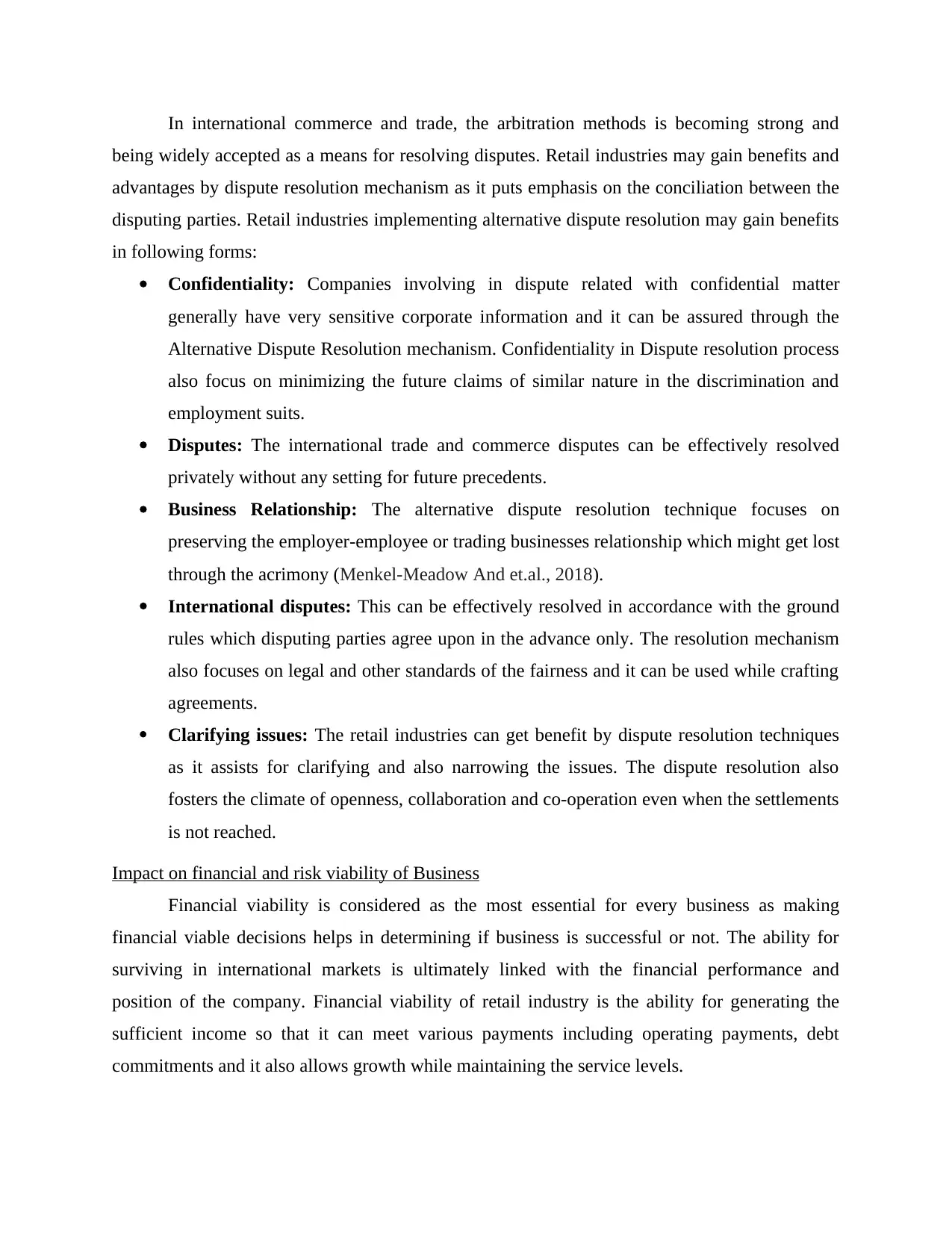
In international commerce and trade, the arbitration methods is becoming strong and
being widely accepted as a means for resolving disputes. Retail industries may gain benefits and
advantages by dispute resolution mechanism as it puts emphasis on the conciliation between the
disputing parties. Retail industries implementing alternative dispute resolution may gain benefits
in following forms:
Confidentiality: Companies involving in dispute related with confidential matter
generally have very sensitive corporate information and it can be assured through the
Alternative Dispute Resolution mechanism. Confidentiality in Dispute resolution process
also focus on minimizing the future claims of similar nature in the discrimination and
employment suits.
Disputes: The international trade and commerce disputes can be effectively resolved
privately without any setting for future precedents.
Business Relationship: The alternative dispute resolution technique focuses on
preserving the employer-employee or trading businesses relationship which might get lost
through the acrimony (Menkel-Meadow And et.al., 2018).
International disputes: This can be effectively resolved in accordance with the ground
rules which disputing parties agree upon in the advance only. The resolution mechanism
also focuses on legal and other standards of the fairness and it can be used while crafting
agreements.
Clarifying issues: The retail industries can get benefit by dispute resolution techniques
as it assists for clarifying and also narrowing the issues. The dispute resolution also
fosters the climate of openness, collaboration and co-operation even when the settlements
is not reached.
Impact on financial and risk viability of Business
Financial viability is considered as the most essential for every business as making
financial viable decisions helps in determining if business is successful or not. The ability for
surviving in international markets is ultimately linked with the financial performance and
position of the company. Financial viability of retail industry is the ability for generating the
sufficient income so that it can meet various payments including operating payments, debt
commitments and it also allows growth while maintaining the service levels.
being widely accepted as a means for resolving disputes. Retail industries may gain benefits and
advantages by dispute resolution mechanism as it puts emphasis on the conciliation between the
disputing parties. Retail industries implementing alternative dispute resolution may gain benefits
in following forms:
Confidentiality: Companies involving in dispute related with confidential matter
generally have very sensitive corporate information and it can be assured through the
Alternative Dispute Resolution mechanism. Confidentiality in Dispute resolution process
also focus on minimizing the future claims of similar nature in the discrimination and
employment suits.
Disputes: The international trade and commerce disputes can be effectively resolved
privately without any setting for future precedents.
Business Relationship: The alternative dispute resolution technique focuses on
preserving the employer-employee or trading businesses relationship which might get lost
through the acrimony (Menkel-Meadow And et.al., 2018).
International disputes: This can be effectively resolved in accordance with the ground
rules which disputing parties agree upon in the advance only. The resolution mechanism
also focuses on legal and other standards of the fairness and it can be used while crafting
agreements.
Clarifying issues: The retail industries can get benefit by dispute resolution techniques
as it assists for clarifying and also narrowing the issues. The dispute resolution also
fosters the climate of openness, collaboration and co-operation even when the settlements
is not reached.
Impact on financial and risk viability of Business
Financial viability is considered as the most essential for every business as making
financial viable decisions helps in determining if business is successful or not. The ability for
surviving in international markets is ultimately linked with the financial performance and
position of the company. Financial viability of retail industry is the ability for generating the
sufficient income so that it can meet various payments including operating payments, debt
commitments and it also allows growth while maintaining the service levels.
⊘ This is a preview!⊘
Do you want full access?
Subscribe today to unlock all pages.

Trusted by 1+ million students worldwide
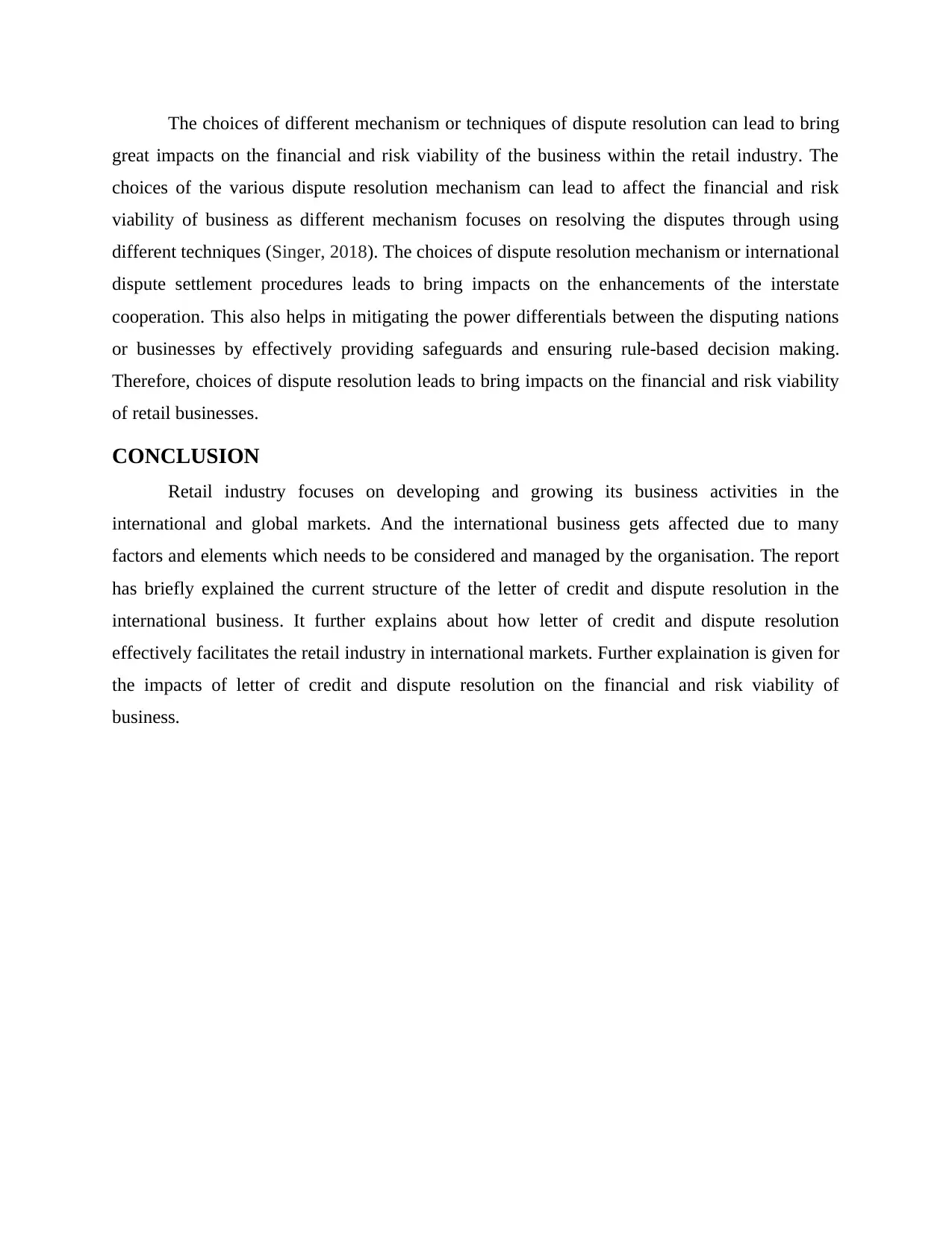
The choices of different mechanism or techniques of dispute resolution can lead to bring
great impacts on the financial and risk viability of the business within the retail industry. The
choices of the various dispute resolution mechanism can lead to affect the financial and risk
viability of business as different mechanism focuses on resolving the disputes through using
different techniques (Singer, 2018). The choices of dispute resolution mechanism or international
dispute settlement procedures leads to bring impacts on the enhancements of the interstate
cooperation. This also helps in mitigating the power differentials between the disputing nations
or businesses by effectively providing safeguards and ensuring rule-based decision making.
Therefore, choices of dispute resolution leads to bring impacts on the financial and risk viability
of retail businesses.
CONCLUSION
Retail industry focuses on developing and growing its business activities in the
international and global markets. And the international business gets affected due to many
factors and elements which needs to be considered and managed by the organisation. The report
has briefly explained the current structure of the letter of credit and dispute resolution in the
international business. It further explains about how letter of credit and dispute resolution
effectively facilitates the retail industry in international markets. Further explaination is given for
the impacts of letter of credit and dispute resolution on the financial and risk viability of
business.
great impacts on the financial and risk viability of the business within the retail industry. The
choices of the various dispute resolution mechanism can lead to affect the financial and risk
viability of business as different mechanism focuses on resolving the disputes through using
different techniques (Singer, 2018). The choices of dispute resolution mechanism or international
dispute settlement procedures leads to bring impacts on the enhancements of the interstate
cooperation. This also helps in mitigating the power differentials between the disputing nations
or businesses by effectively providing safeguards and ensuring rule-based decision making.
Therefore, choices of dispute resolution leads to bring impacts on the financial and risk viability
of retail businesses.
CONCLUSION
Retail industry focuses on developing and growing its business activities in the
international and global markets. And the international business gets affected due to many
factors and elements which needs to be considered and managed by the organisation. The report
has briefly explained the current structure of the letter of credit and dispute resolution in the
international business. It further explains about how letter of credit and dispute resolution
effectively facilitates the retail industry in international markets. Further explaination is given for
the impacts of letter of credit and dispute resolution on the financial and risk viability of
business.
Paraphrase This Document
Need a fresh take? Get an instant paraphrase of this document with our AI Paraphraser
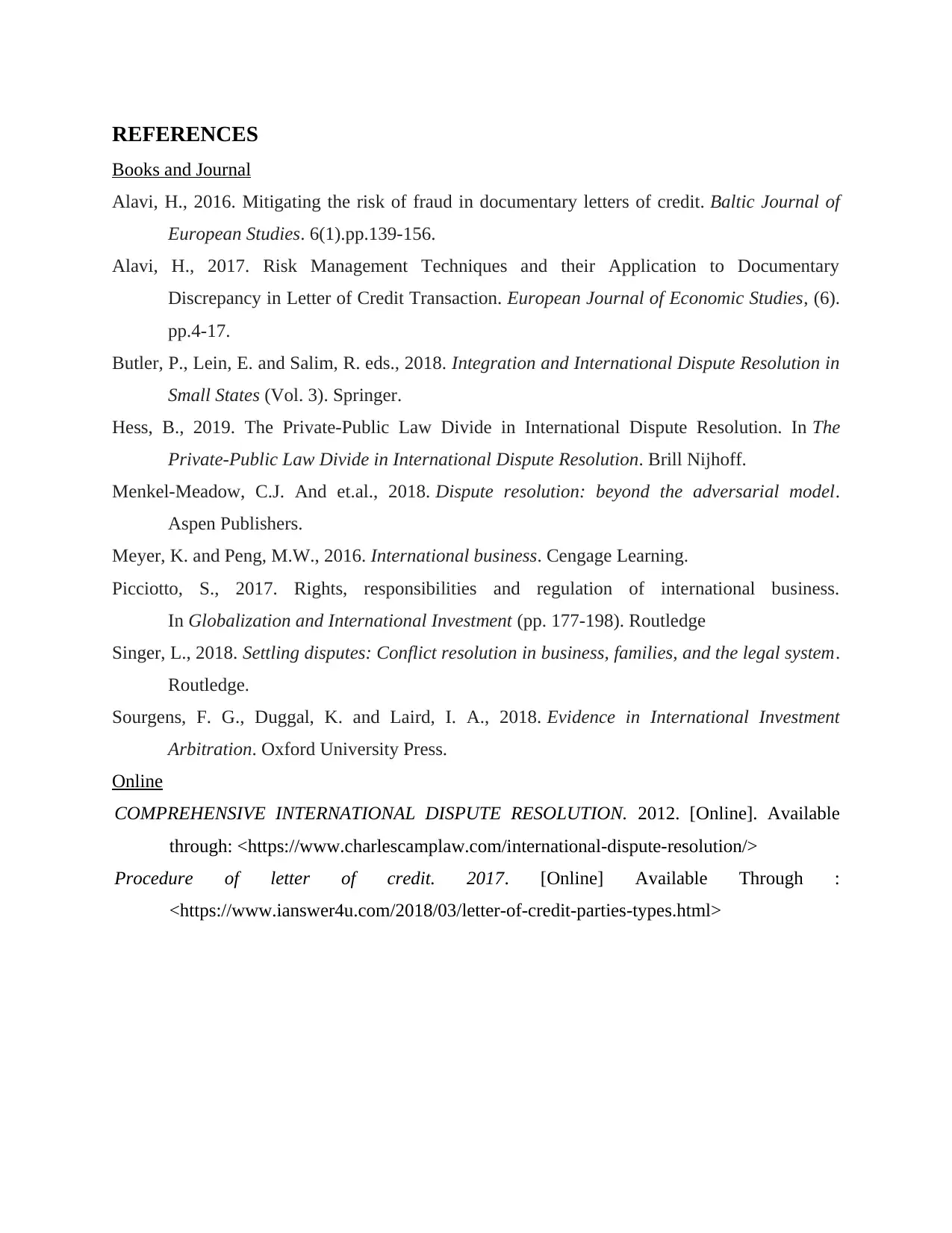
REFERENCES
Books and Journal
Alavi, H., 2016. Mitigating the risk of fraud in documentary letters of credit. Baltic Journal of
European Studies. 6(1).pp.139-156.
Alavi, H., 2017. Risk Management Techniques and their Application to Documentary
Discrepancy in Letter of Credit Transaction. European Journal of Economic Studies, (6).
pp.4-17.
Butler, P., Lein, E. and Salim, R. eds., 2018. Integration and International Dispute Resolution in
Small States (Vol. 3). Springer.
Hess, B., 2019. The Private-Public Law Divide in International Dispute Resolution. In The
Private-Public Law Divide in International Dispute Resolution. Brill Nijhoff.
Menkel-Meadow, C.J. And et.al., 2018. Dispute resolution: beyond the adversarial model.
Aspen Publishers.
Meyer, K. and Peng, M.W., 2016. International business. Cengage Learning.
Picciotto, S., 2017. Rights, responsibilities and regulation of international business.
In Globalization and International Investment (pp. 177-198). Routledge
Singer, L., 2018. Settling disputes: Conflict resolution in business, families, and the legal system.
Routledge.
Sourgens, F. G., Duggal, K. and Laird, I. A., 2018. Evidence in International Investment
Arbitration. Oxford University Press.
Online
COMPREHENSIVE INTERNATIONAL DISPUTE RESOLUTION. 2012. [Online]. Available
through: <https://www.charlescamplaw.com/international-dispute-resolution/>
Procedure of letter of credit. 2017. [Online] Available Through :
<https://www.ianswer4u.com/2018/03/letter-of-credit-parties-types.html>
Books and Journal
Alavi, H., 2016. Mitigating the risk of fraud in documentary letters of credit. Baltic Journal of
European Studies. 6(1).pp.139-156.
Alavi, H., 2017. Risk Management Techniques and their Application to Documentary
Discrepancy in Letter of Credit Transaction. European Journal of Economic Studies, (6).
pp.4-17.
Butler, P., Lein, E. and Salim, R. eds., 2018. Integration and International Dispute Resolution in
Small States (Vol. 3). Springer.
Hess, B., 2019. The Private-Public Law Divide in International Dispute Resolution. In The
Private-Public Law Divide in International Dispute Resolution. Brill Nijhoff.
Menkel-Meadow, C.J. And et.al., 2018. Dispute resolution: beyond the adversarial model.
Aspen Publishers.
Meyer, K. and Peng, M.W., 2016. International business. Cengage Learning.
Picciotto, S., 2017. Rights, responsibilities and regulation of international business.
In Globalization and International Investment (pp. 177-198). Routledge
Singer, L., 2018. Settling disputes: Conflict resolution in business, families, and the legal system.
Routledge.
Sourgens, F. G., Duggal, K. and Laird, I. A., 2018. Evidence in International Investment
Arbitration. Oxford University Press.
Online
COMPREHENSIVE INTERNATIONAL DISPUTE RESOLUTION. 2012. [Online]. Available
through: <https://www.charlescamplaw.com/international-dispute-resolution/>
Procedure of letter of credit. 2017. [Online] Available Through :
<https://www.ianswer4u.com/2018/03/letter-of-credit-parties-types.html>
1 out of 11
Related Documents
Your All-in-One AI-Powered Toolkit for Academic Success.
+13062052269
info@desklib.com
Available 24*7 on WhatsApp / Email
![[object Object]](/_next/static/media/star-bottom.7253800d.svg)
Unlock your academic potential
Copyright © 2020–2025 A2Z Services. All Rights Reserved. Developed and managed by ZUCOL.





